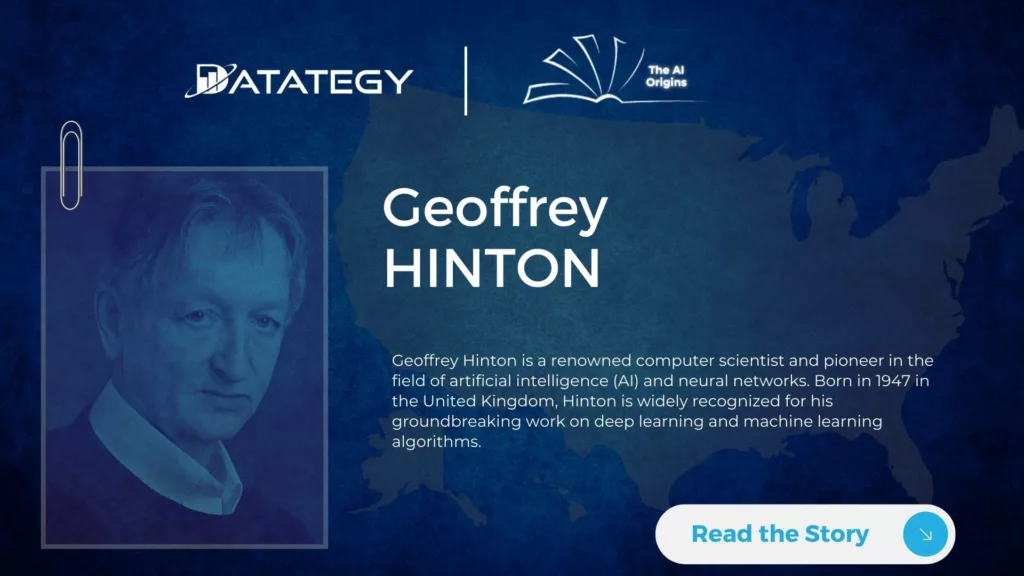Understanding Multimodal AI Complexity Businesses commonly use the term “multimodal”...
Read MoreThe AI Origins: Geoffrey HINTON
Table of Contents
ToggleWelcome to ” The AI Origin “ series. In this collection of articles, we take you on an inspiring journey through the history of artificial intelligence, focusing on the remarkable individuals who have played a crucial role in making AI accessible to everyone.
Throughout these articles, we’ll dive into the life stories and contributions of these innovative minds who have reshaped the AI landscape, paving the way for a more inclusive and transformative future. Join us as we celebrate the human ingenuity behind the AI revolution and explore the extraordinary individuals who have made it all possible.

Geoffrey Hinton stands as a trailblazer in the realm of artificial intelligence (AI), renowned for his pioneering work in deep learning. Originally from Britain, his groundbreaking contributions have propelled the field of AI forward. In 2018, Hinton was bestowed with the prestigious Turing Award, a testament to his exceptional achievements and profound impact on computer science. Armed with a wealth of experience in AI research, he remains at the forefront of innovation, actively shaping the trajectory of AI and machine learning.
Key Dates About Geoffrey Hinton
| Date | Event |
|---|---|
| 1947 | Geoffrey Hinton is born in Wimbledon, London, United Kingdom. |
| 1978 | Pursues doctoral studies at University of Edinburgh under the supervision of Christophe Longuet-Higgins. |
| 1986 | Co-invents Boltzmann machines, a stochastic neural network model. |
| 2012 | Co-authors paper on deep learning methods that significantly advances image recognition accuracy. |
| 2018 | Awarded the Turing Award, alongside Yoshua Bengio and Yann LeCun, for pioneering contributions to deep learning. |
| Present | Continues to actively research and develop AI models, contributing to advancements in natural language processing. |
A Major Contribution to the Unsupervised Learning
Geoffrey Hinton’s contributions have been instrumental in advancing the field of deep learning, particularly through his groundbreaking work on Boltzmann machines and their application in unsupervised learning. Hinton’s innovative research has revolutionized how machines understand and interpret complex data structures, paving the way for significant advancements in various domains, including natural language processing and generative modeling.
His pioneering studies have empowered machines to extract meaningful insights from unstructured data, enabling breakthroughs in tasks such as language translation, sentiment analysis, and creative content generation. Hinton’s visionary approach has reshaped the landscape of artificial intelligence, unlocking new possibilities for machine intelligence and human-computer interaction.
Benefits of Boltzmann Machines in Machine Learning
| Benefit | Description |
|---|---|
| Unsupervised Learning | Boltzmann machines excel in unsupervised learning tasks, where the model learns to represent the underlying structure of data without explicit labels. This capability is essential for tasks like data clustering and feature learning. |
| Generative Modeling | Boltzmann machines are proficient in generating new data samples that resemble the training data distribution. This ability is valuable for tasks such as data augmentation, anomaly detection, and generating realistic synthetic data for training other models. |
| Handling Complex Distributions | Boltzmann machines can model complex data distributions with high-dimensional and nonlinear relationships among variables. This capability allows them to capture intricate patterns and dependencies present in real-world data. |
| Parallelizable Training | Boltzmann machines can be trained efficiently in parallel, leveraging modern computing architectures such as GPUs or distributed computing frameworks. This parallelizability accelerates the training process, especially for large-scale datasets. |
| Robustness to Noisy Data | Boltzmann machines exhibit robustness to noisy data, as they can effectively model and represent uncertain or corrupted input patterns. This property makes them suitable for tasks where data quality may vary or contain errors. |
Interested in discovering papAI?
Our AI expert team is at your disposal for any questions
How Do AI Predictive Models Estimate Car Prices?
How Do AI Predictive Models Estimate Car Prices? Valuation methods...
Read More“DATATEGY EARLY CAREERS PROGRAM” With Tommy GUYOT
“DATATEGY EARLY CAREERS PROGRAM” With Tommy GUYOT Hello! My name...
Read More


